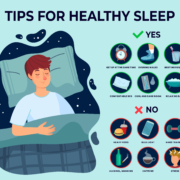5 Tips to Beat Insomnia
Insomnia can be a challenging condition, disrupting your sleep and impacting your overall health and well-being. At Comprehensive Sleep Care Center, we understand the importance of a good night’s sleep and offer these five tips to help you beat insomnia and improve your sleep quality.
-
Establish a Consistent Sleep Schedule
Your body thrives on routine. Going to bed and waking up at the same time every day, even on weekends, helps regulate your internal clock. This consistency signals to your body when it’s time to sleep and wake up, making it easier to fall asleep and wake up feeling refreshed.
-
Create a Relaxing Bedtime Routine
A calming pre-sleep routine can signal to your body that it’s time to wind down. Consider activities such as:
- Reading a Book: Choose something light and non-stimulating.
- Taking a Warm Bath: The drop in body temperature post-bath can help induce sleepiness.
- Practicing Relaxation Techniques: Deep breathing, meditation, or gentle yoga can ease your mind and body into a state ready for sleep.
-
Optimize Your Sleep Environment
Your bedroom should be a sanctuary for sleep. Ensure it’s:
- Cool, Dark, and Quiet: Use blackout curtains, earplugs, or a white noise machine if necessary.
- Comfortable: Invest in a good mattress and pillows that support your sleep posture.
- Technology-Free: Keep electronic devices out of the bedroom to avoid the blue light that can interfere with melatonin production.
-
Be Mindful of Your Diet and Exercise
What you eat and drink, and when you do so, can impact your sleep:
- Avoid Caffeine and Nicotine: These stimulants can disrupt sleep if consumed too close to bedtime.
- Limit Alcohol: While it might make you drowsy, alcohol can interfere with the quality of your sleep.
- Eat Light in the Evening: Heavy meals before bed can cause discomfort and indigestion, making it harder to fall asleep.
- Exercise Regularly: Physical activity can promote better sleep but try to finish exercising at least a few hours before bedtime.
-
Manage Stress and Anxiety
Stress and anxiety are common culprits of insomnia. Finding ways to manage these can improve your sleep:
- Journaling: Writing down your thoughts can help clear your mind.
- Cognitive Behavioral Therapy (CBT-I): This is a highly effective treatment for insomnia that helps you address the thoughts and behaviors that contribute to sleep problems.
- Professional Help: If stress and anxiety persist, consider seeking support from a therapist or counselor.
Conclusion
Overcoming insomnia often requires a combination of lifestyle changes and professional guidance. By incorporating these tips into your daily routine, you can create an environment conducive to sleep and develop habits that support better rest. At Comprehensive Sleep Care Center, we are dedicated to helping you achieve restorative sleep. If you continue to struggle with insomnia, don’t hesitate to reach out to our team of experts for personalized care and support











